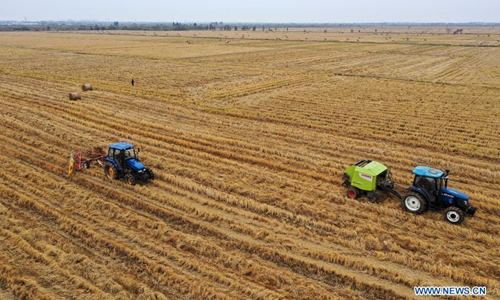Phase one deal won't affect China’s grain import quotas: report

Workers of a wheat straw recycling company collect wheat straw in the field in Jiangxiang Town of Nanchang County, Nanchang, east China's Jiangxi Province, Nov. 29, 2019. (Xinhua/Peng Zhaozhi)
The phase one trade deal between China and the US will not change China's import quotas for major grains, according to a report by Caixin on Tuesday that citied Vice Minister of Agriculture and Rural Affairs Han Jun, who is a member of China's trade negotiation team.
China has agreed to increase the purchase of agricultural products from the US by large amount in the phase one deal, reached in December 2019, but the terms of the deal will not affect China's global import quotas of rice, wheat and corn, according to Han.
Imports account for but a fraction of the overall supply of grain in China. The country's import quotas for 2020 are unchanged from the previous year, including 9.6 million tons of wheat, 7.2 million tons of corn and 5.3 million tons of rice. The tariff rate on imports within the quotas is 1 percent, while imports exceeding the quota are subject to a 65 percent tariff, the National Development and Reform Commission (NDRC) announced in September 2019.
A total of 137.5 million tons of wheat will be supplied in China from June 2019 to May 2020, and 213 million tons of rice will be supplied from October 2019 to September 2020, according to a report by the Xinhua News Agency.
"Grain imports concern food security, so it is very unlikely that they can be affected by the trade war," Bai Ming, deputy director of the Ministry of Commerce's International Market Research Institute, told the Global Times on Monday.
Jiao Shanwei, editor-in-chief of grain news website cngrain.com, said that it would be a shock to China's farmers and grain market if the import quotas were opened up, as the current grain price is higher in China than the international price.
"China realizes a high level of self-sufficiency for major staple food products, including 100 percent for both wheat and rice and more than 95 percent for corn," Jiao said.
Import quotas for major agricultural products are usually not met by the actual import amount. As of November 2019, China had only imported 9.2 million tons of wheat, corn and rice, according to statistics from the General Administration of Customs, fulfilling less than half of the import quotas for 2019.
- China to import more EU wheat, diversifying supplies: analyst
- CBOT wheat up sharply, soybeans slump in holiday-shortened week
- Workers collect wheat straw in Nanchang, east China's Jiangxi
- Workers collect wheat straw in Nanchang, east China's Jiangxi
- Scenery of wheat fields near Lenningen, Luxembourg